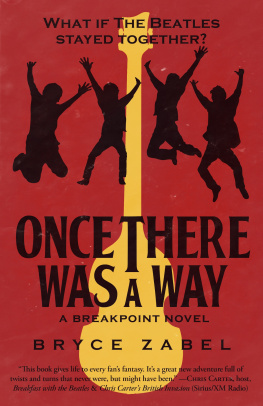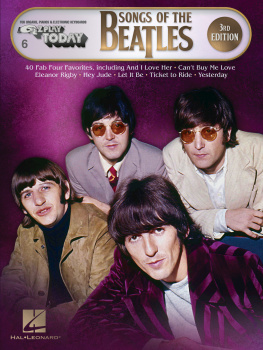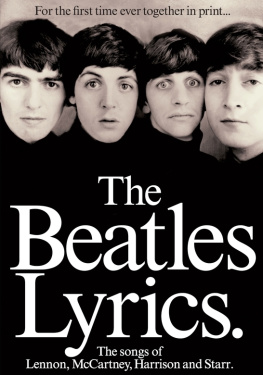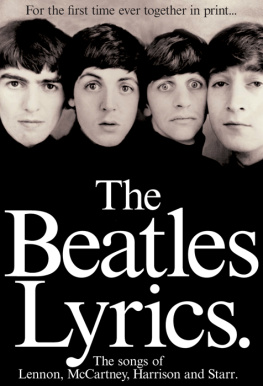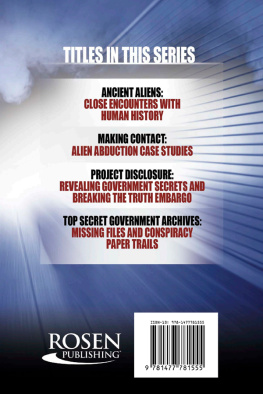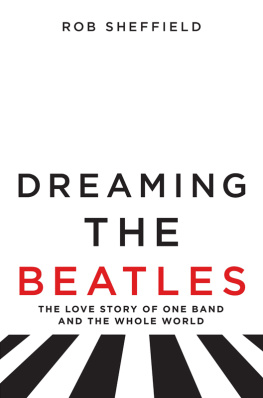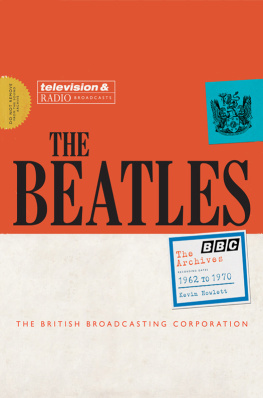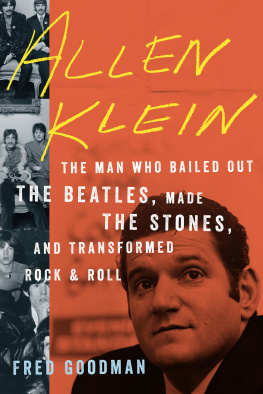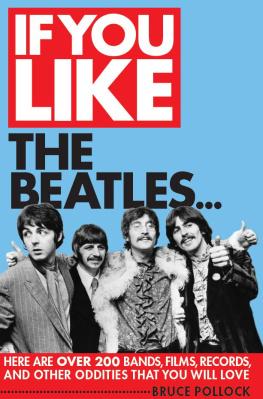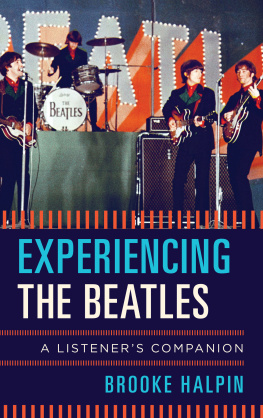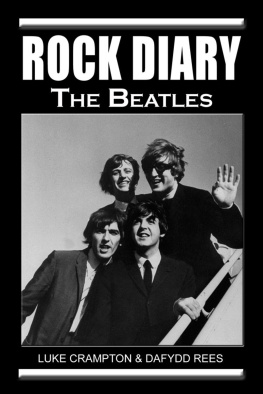Copyright
Diversion Books
A Division of Diversion Publishing Corp.
443 Park Avenue South, Suite 1008
New York, NY 10016
www.DiversionBooks.com
Copyright 2017 by Bryce Zabel
All rights reserved, including the right to reproduce this book or portions thereof in any form whatsoever.
For more information, email
First Diversion Books edition December 2017
ISBN: 978-1-68230-320-7
Also by Bryce Zabel
Surrounded by Enemies: What if Kennedy Survived Dallas?
A.D. After Disclosure: When the Government Finally Reveals the Truth About Alien Contact (with Richard Dolan)
This is a fictional work of alternate history. Although its form is that of a journalistic account, it is not one. Names, characters, places, and incidents are either the products of the authors imagination or are drawn from the historical record, then altered and used fictitiously. The characters of John Lennon, Paul McCartney, George Harrison, Richard Starkey, and others have been projected into an alternative reality and, therefore, have no factual basis. Dialogues and action in the novel reflect the fictitious characters only and not real individuals. Any resemblance to other actual persons, living or dead, is entirely coincidental.
As always, for Jackie, with all my loving.
Introduction
Imagine an alternative realityits easy if you try.
Back in June 10, 1976, I was a brand-new reporter at KZEL-FM, a counter-culture radio station in Eugene, Oregon. For the first time, Paul McCartney was touring America with his new band, Wings, when my program director came to what we called the News Cave to see me. I just got a phone call, he said. If its going to happen, its going to happen tonight.
It was the much-discussed, always out-of-reach Beatles reunion. I was given a show ticket, told to get in my 1965 Ford Mustang and start driving immediately to Seattle, about six hours away.
The entire ride up I could feel the very atoms of my being vibrating with anticipation to see John, Paul, George, and Ringo back on stage as the Beatles. As it turned out, the Beatles didnt get back together that night up at the Seattle Kingdome when sixty-seven thousand fans showed up, eclipsing the live audience record of the Fab Four. Instead, McCartney gave his audience a riveting run-through of Wings music but played less than a half dozen Beatles songs late in the show. I had seen a Beatle play live, and it was amazing beyond belief, yet there was still disappointment on the way out to the parking lot. Such is the power of the Beatles and the desire of fans to see them together.
Half a lifetime later, this attraction remains the greatest What if? in rock music history, even though Lennons murder and Harrisons cancer and decades of time have removed any possibility at all of it ever happening. Still, the mind and the heart want what they want.
What if John Lennon, Paul McCartney, George Harrison, and Richard Starkey had actually worked it out at the end of the 1960s and kept making music as the Beatles for a few more years? Or longer? Or just kept going like their contemporaries, the Rolling Stones?
Once There Was a Way is the answer. Or at least one answer.
You may say Im a dreamer, but Im not the only one.
Bryce Zabel
December 5, 2017
Los Angeles
No ones more surprised than I am that the Beatles made it. Maybe Yoko.
John Lennon
Play, quit, repeat. Thats been the secret.
Paul McCartney
Spiritual wisdom means not wasting the gifts of the Universe, even if its the three of them.
George Harrison
We all quit. We just never all quit for good at the same time.
Ringo Starr
From interviews with Rockstar editor, Booth Hill.
From the Editor of Rockstar Magazine
Americans of a certain age still remember vividly how inevitable it once was that the worlds greatest rock group would break up. The four youthful Moptops who seemed like best friends had become four angry men who acted like mortal enemies. From 1968 to 1971, virtually everyone knew the Beatles would be finished sooner than later.
And yet they were not. Somehow history broke in another direction. As a consequence, John Lennon, Paul McCartney, George Harrison, and Richard Starkey aged in place on performance stages and recording studios, playing a part in our lives from the moment they came to America in 1964, over fifty years ago.
From 1968 through 1975, the years of maximum danger, the Beatles, always on the edge of dissolution, still continued to produce a creative output of outrageously honest poetry, tuneful rock operas, and passionate tributes to a higher power. They took long vacations from each other, yes, but still found their way back home time and again.
If the Beatles had disbanded in 1970, they would still be fiercely remembered today, and they might even be far more mythic and legendary. By staying together through thick and thin, they convinced us that they would always be there for us. While we never took them for granted, we began to see them as part of our current musical landscape. Not a bad thing.
To source our facts, Rockstar has drawn from its own archives a great deal, and, in particular, we have revisited virtually all of the classic sit-down interviews our magazine has conducted with the Beatles over the course of the bands years together. We also put three of our youngest and most expressive journalists on the jobColeman Birdwell, LeAnne Falby, and Emmer Hoffmanand told them to talk to everyone again. None of this trio was even alive when the Beatles nearly broke up in 1969. They have spent the better part of a year talking to spouses, children, friends, collaborators, enemies, competitors, and fans of the Beatles, and they have merged it into a fresh perspective.
The truth that they have reported here is universal. The Beatles were not destined to break apart or stay together. They made a choice to look beyond the slights, the disagreements, and their individual desires. They chose to remain the Beatles. This is how they did it.
Booth Hill
Editor, Rockstar
Chapter One:
A DOLLS HOUSE (1968)
They Blew His Mind Out in a Bar
In May 1968, Paul McCartney and John Lennon traveled together to New York City to tell the world that Apple Corps Ltd. was the new company behind the Beatles. The New York Post headline proclaimed Beatles Pitch Apple in the Big Apple.
McCartney and Lennon labored through multiple press briefings and interviews to explain why they had done it. McCartney took the position that it was a natural extension of the brand, a way to control their own destinies. The Beatles are more than records, he explained. Were a bit of everything these days, arent we? We have to watch out for ourselves.
The reality was that Apple had been conceived as a tax dodge shortly after the death of their manager, Brian Epstein, in the late summer of 1967. Truly on their own then, the Beatles had received sobering news that over 4MM would need to be paid in taxes by the Beatles unless the money was used for business purposes. It was simple survival math since corporate tax rates were far lower than those for individuals. Under the new arrangement worked out by lawyers and accountants, each Beatle would own 5 percent of a company known as Beatles and Co. and Appleowned collectively by all four Beatleswould own the other 80 percent.
This line of reasoning played out as far too mercenary and boring for John Lennon, who chose to cast the entire decision as primarily a creative one. Its so people who want to make a record or a film, you know, dont have to go on their knees in an office, begging for a break. They can just come to us and sit in one of our chairs if they want.

